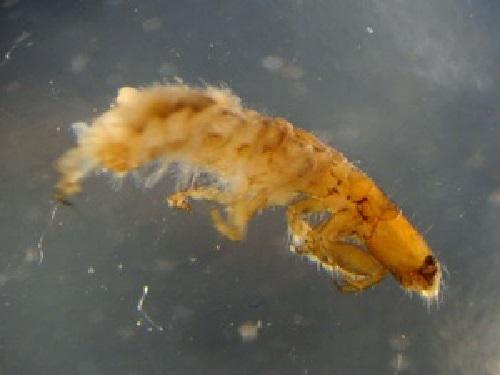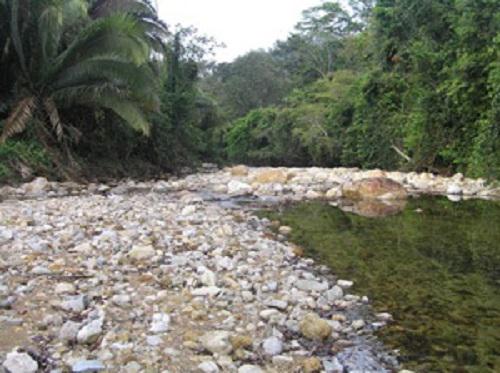Rachael Carrie
Other projects
This project will contribute to the development of robust, cost-effective, and sustainable bio- assessment tools to monitor and manage threats to tropical freshwater ecosystems.

Plectromacronema sp. collected from the Golden Stream. © Mike Dobson.
Mesoamerica is an area of global biodiversity importance sustaining 10% of all known life forms within <0.5% of the world’s terrestrial surface area . Belize contains one of the last contiguous forest blocks in this area and the second largest barrier reef in the world. This forest is being lost at twice the rate seen elsewhere in Central America, with riparian loss particularly high in some regions (Young, 2008). River corridors link these degraded areas to the near-shore, where land-based run-off is ranked second in its potential severity and scope of impact to the Belize Barrier Reef (B.E.S.T., 2007).

Richardson Creek, Bladen Nature Reserve.
In addition to their function as corridors, freshwater ecosystems are of biodiversity value in their own right and there is growing awareness of their global crisis (Dudgeon et al., 2006). Freshwater bio-monitoring is integral to watershed management throughout the developed world. However, many tropical developing countries, including Belize, lack formal procedures and methods for monitoring and managing water quality: knowledge of tropical aquatic taxonomy, seasonality and impact response is poorly understood, standardized monitoring and assessment techniques are not available and technical and logistical capacity has not been developed.
This project will investigate natural biological variability and variation in response to anthropogenic impact to contribute to the development of monitoring tools that are able to indicate river health. It will provide a crucial component to the development of standardised and cost-effective methods, allowing those charged with managing the conservation value of freshwater ecosystems to monitor impacts and evaluate the effectiveness of management activities.
Baseline datasets and taxonomic reference collections resulting from this project will provide a lasting legacy to nature conservation in the tropics. All research is being conducted in collaboration with a local NGO (http://www.yct.bz), and contribute to a wider initiative aiming to encourage riparian, freshwater, near-shore and marine nature conservation through integrated watershed management. The development of technical skills will enhance ability to implement freshwater monitoring and management - a need recognised globally within the UN Convention on Biological Diversity, regionally by the Mesoamerica Biological Corridor, and locally by all signatories to the various national biodiversity and land-use plans and conservation action strategies.
*B.E.S.T. 2007. Updated Site Strategy Of The Belize Reef Reserve System World Heritage Site. Compact.
*Dudgeon, D., Arthington, A. H., Gessner, M. O., Kawabata, Z. I., Knowler, D. J., Leveque, C., Naiman, R. J., Prieur-Richard, A. H., Soto, D., Stiassny, M. L. J. & Sullivan, C. A. 2006. Freshwater Biodiversity: Importance, Threats, Status and Conservation Challenges. Biological Reviews, 81, 163-182.
*Young, C. 2008. Belize's Ecosystems: Threats and Challenges to Conservation in Belize. Tropical Conservation Science 1, 18-33.